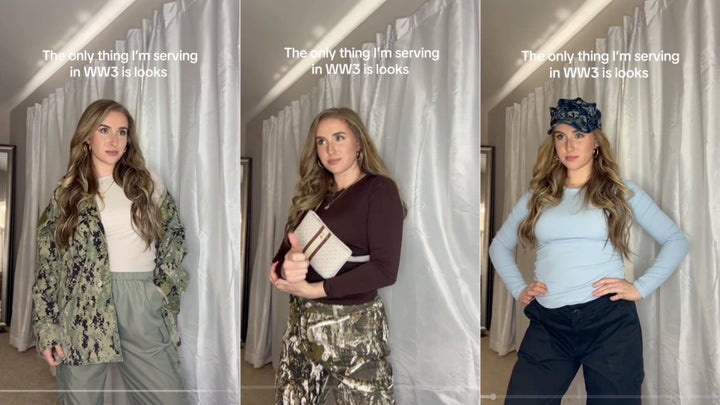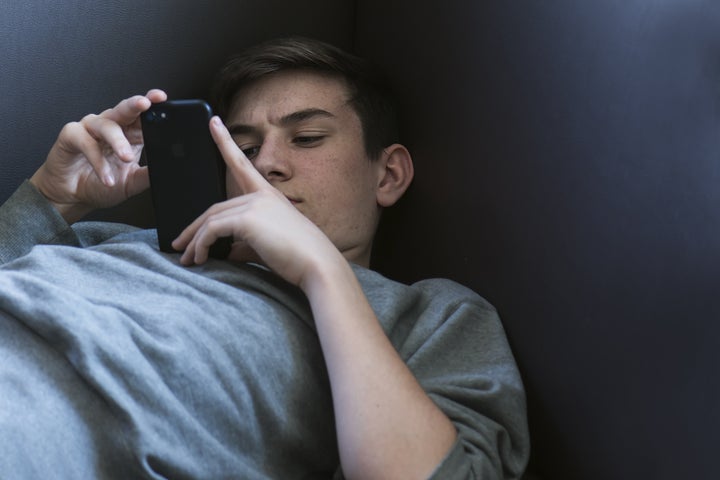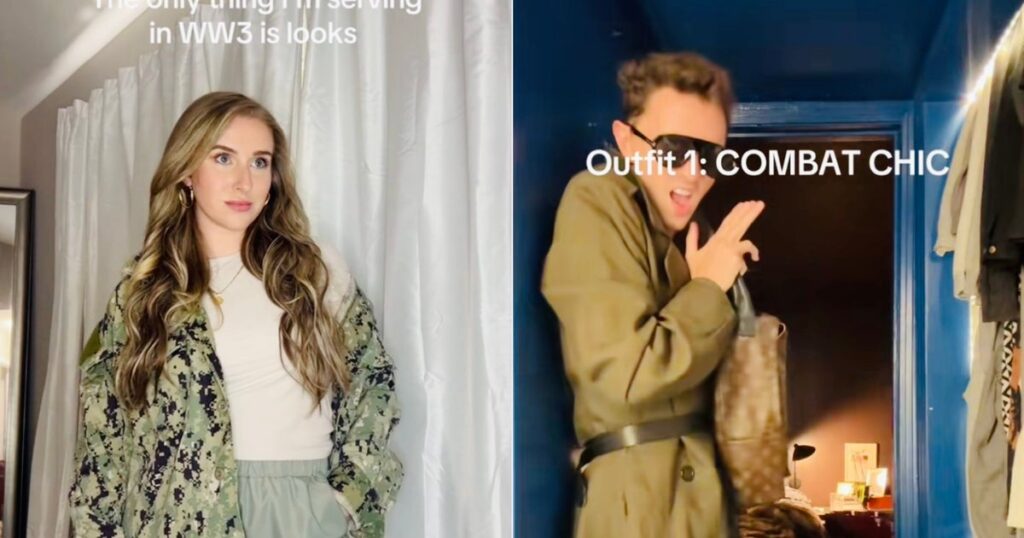While President Donald Trump realizes that his Israel-Iran ceasefire agreement may not be as binding as he suspected ― both countries continue to fire missiles at each other ― Gen Z isn’t wasting any time: On TikTok, “WW3 fits” has been trending for days, with teens and twenty-somethings sharing the camo-heavy looks they jokingly say they’ll wear in the event of a nuclear world war. Fun?
“First war kinda nervous,” Avery, a content creator, captioned a clip featuring her WW3 wardrobe, which includes a camouflage miniskirt and a bomber jacket.
A few TikTokkers who are enlisted in the U.S. Army joked that they already had their WWIII look picked out for them, flashing to closets full of fatigues.
Ethan Hillis, 26, showed off his potential World War III looks in a video he was careful to caption: “just a coping mechanism.” There’s combat chic (a green trench coat), spy (a fedora and coat) and political ex-wife (basically MAGA mom cosplay).
“My WWIII fit is a bit of satire and a bit of style, think something like combat but make it couture,” Hillis told HuffPost in an email interview.
“I wanted to play with the idea of absurd preparedness while still looking fabulous,” he said. “It felt like a funny and fashion-forward way to comment on the state of the world without diving into doom.”
The videos are all soundtracked to Kesha’s 2010 hit “Blow” (Sample lyric: “This place about to blow, oh-oh-oh-oh-oh-oh”), which only adds to the absurdity.
Most people joke along in the comment sections of the videos: “This generation is so unserious. I love it,” one person wrote.
“This generation is only afraid of pregnancy,” another joked.
Others found the brand of humor distasteful, as the conflict between Israel and Iran continues to unfold and airstrikes have left at least 28 people dead in Israel and hundreds in Iran.
“Lives are at stake,” one person wrote in the comments of Avery’s video. “The future of our world is unfolding in front of us and YOU POST THIS.”
Gen Z-ers we spoke to say they recognize the severity of what’s happening and aren’t trying to downplay it with their videos.
“The jokes are coming from a place of real exhaustion and awareness,” Hillis said. “I don’t think people realize how tuned in Gen Z is. All the irony and outfits are just the packaging. Underneath is real fear, and real care.”
Christina Spah, a 26-year-old who posted a video of her WW3 fits ― looks that are ”‘apocalyptic chic’ meets ‘functional mom,’” she told HuffPost ― sees the jokes as a coping mechanism.
“As a military spouse and stay-at-home mom, I don’t have much time to cry or panic in difficult times. I have to hold my head high and pretend everything is fine until I put my daughters to bed at night,” she said. “In the meantime, finding humor about the prospect of another war in the Middle East allows me to feel any form of control in this awful situation.”

Gen Z is used to using dark humor to get through hard times and trauma.
There’s little that Gen Z ― the demographic born between the late 1990s and the early 2010s ― won’t meme-ify: On social media, everything from the the 2023 Titan submersible fiasco, to the 9/11 terror attacks, and celebrities’ deaths and suicides (or being “unalived,” as they prefer to say) ― have gotten the meme treatment. (Gen Z wasn’t even alive when the twin towers fell. To be, though, comedians were cracking jokes about 9/11 no less than a few weeks later ― at least Gilbert Gottfried was.)
They haven’t experienced any comparable terrorist attacks but Gen Z has been through a lot themselves: A pandemic and lockdowns, the Great Recession for the older ones, school shootings and subsequent active shooter drills, protests over police brutality and political polarization that’s damaged friendships and splintered families.
Gen Z’s supposed “unseriousness” on social media may actually be a deeply layered response to chronic exposure to the news cycle, said Rana Bull, a therapist who works primarily with Gen Z, and the owner of Burrow and Bloom Therapy in Arizona.
“They’ve experienced a constant stream of secondhand trauma through social media,” Bull said. That affects us all, but Gen Z experienced it in their formative years.
Secondhand trauma, or indirect exposure to distressing events, can desensitize people over time, especially when it’s experienced repeatedly and without resolution, she said.

imageBROKER/Helmut Meyer zur Capellen via Getty Images
“For Gen Z, this has resulted in a sort of emotional callus; they’re rarely surprised by negative news because, for them, it’s not a rarity — it’s the norm,” she said.
There’s also a neurological explanation for why Gen Z may appear disengaged. The brain’s threat-response system is activated differently when a stressor is experienced directly versus indirectly, Bull explained. Social media creates a layer of emotional distance — what psychologists call psychological distancing — which makes it easier to compartmentalize what they’re seeing.
“Humor, irony and absurdity become coping tools that help them regain a sense of control or reduce emotional overload,” she said.
It’s the same kind of dark humor used among first responders or health care workers, Bull said ― when something is too overwhelming to fully process, laughter is tension-breaking.
“So what might appear as flippancy or being ‘unserious’ is actually a form of emotional regulation and resilience, albeit one that can be easily misunderstood.” the therapist said.
Sage Grazer, a therapist in Los Angeles, doesn’t see Gen Z as particularly “unserious” as a generation. Gen Z came of age online (three quarters of Gen Z spend most of their free time online, and many get their news from it, too), so it’s little surprise they process their emotions there as well.
But making arguably stupid jokes about incomprehensible geopolitical issues is a long tradition; consider how Charlie Chaplin used satire to defuse and address the looming threat of Adolf Hitler in “The Great Dictator” in 1940.
There’s limitations to treating things glibly all the time, or without much reflection on why it’s your reflex, Grazer noted.
“Humor can lighten the mood or offer a more positive perspective but it can also become a defense mechanism to shield yourself from harsh realities,”the therapist told HuffPost.
“While we’re not meant to bear the emotional burden of all of the world’s tragedy constantly, leaning on humor can encourage people to be complacent or callous,” she explained. “I also see exposure to all of the jokes as contributing to a numbing or disconnection from the reality of what’s going on in the world.”
But given the unwieldy way President Trump and his war cabinet have communicated operations to the American public, an argument could be made that this conflict has an air of unseriousness, even if that’s gravely not the case.
And unlike millennials, who grew up seeing friends and family enlist for U.S. invasions in Iraq and Afghanistan, Gen Z has yet to fully experience the political culture of the U.S. at war. (Granted, the U.S. didn’t end combat operations in Afghanistan until 2014, and the last United States military forces to depart the country did so on August 30, 2021.)
An earnest question on Reddit’s No Stupid Questions subreddit over the weekend is a testament to how unfamiliar Gen Z is with the prospect of warfare: “What are you supposed to do if a war actually starts?” a person ― one who was clearly either not alive or else very young at the height of the Afghanistan and Iraq wars ― asked. “Like, are we just supposed to keep going to work as normal and live like nothing is happening? Do jobs give time off if you’re city is targeted?”
“First time?” someone older and more war weary replied in the comments.
Ivan Vicente, a content creator who shared his “WW3 fit,” sees the viral TikTok trend as a way to broach bigger, weightier conversations among younger generations. (At 32, he’s technically a millennial but he’s got some “unserious” cusp energy in him.)
“These trends might look silly on the surface, but they help surface real conversations,” he said. “I don’t take war lightly — none of us do — but I think humor becomes a way to process something that feels otherwise too overwhelming.”
Read the full article here








